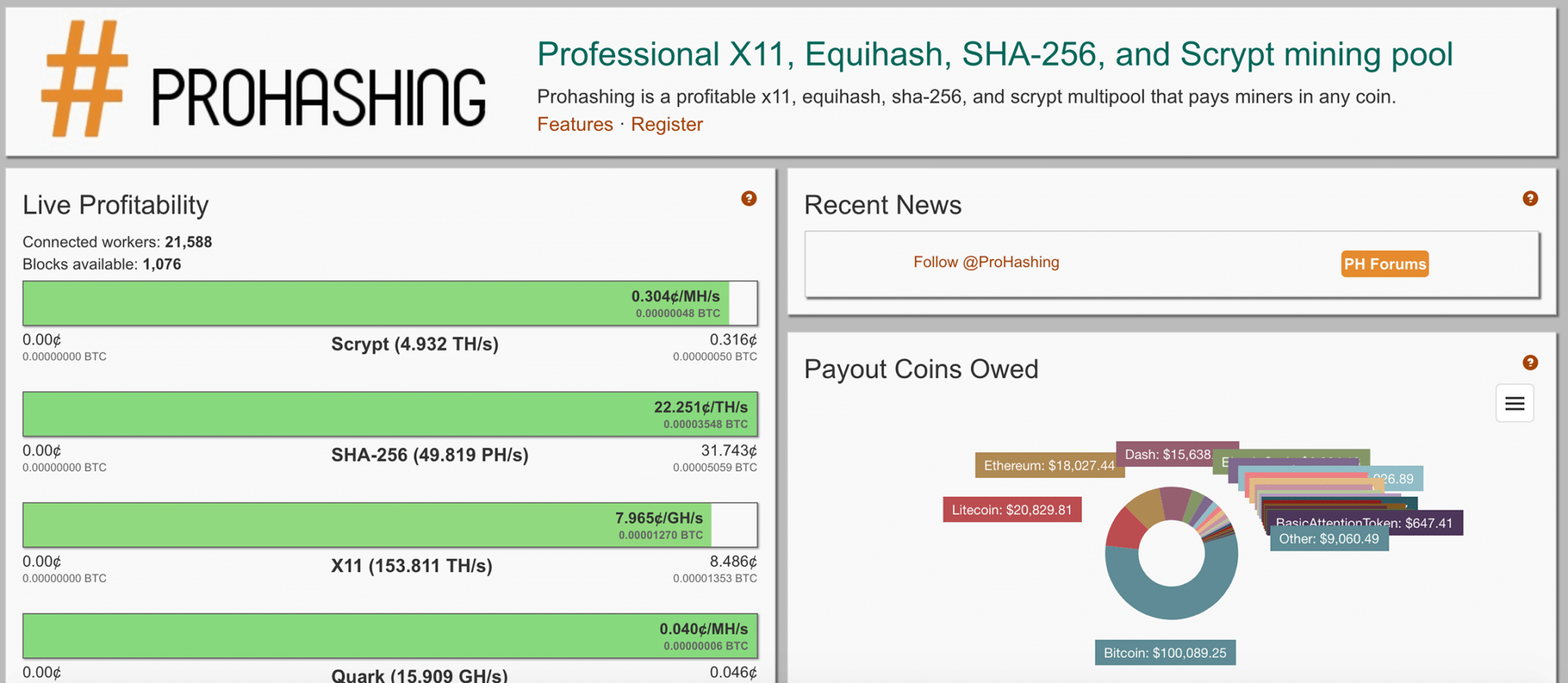So, you want to mine Dogecoin. The good news is you’ve come to the right place to get started mining the most successful meme coin available to humankind.
Welcome to the community that sent the Jamaican Bobsled team to the 2014 Olympics, helped bring clean water to a remote African Village, and sponsored a NASCAR driver at the Talladega Superspeedway – and all under the banner of a Shiba Inu.
Editor’s note: This Dogecoin mining review was originally published in November 2018. It has since been updated to reflect new information and market updates. Please refer to our Dogecoin guide for a more detailed analysis of the Dogecoin project.
Dogecoin: A Very Brief History
Dogecoin was founded by Jackson Palmer with help from Billy Markus. But to say founded is a little misleading since Dogecoin began as a joke, a parody of the moon chasing crypto communities.
Dogecoin, the joke, was started by Jackson Palmer initially on Twitter and later as a website he built. Dogecoin, the cryptocurrency, was released in 2013 by Palmer and Billy Markus with the hope to make cryptocurrencies a little more fun and approachable.
In the past, Doge has been used to crowdfund charitable donations and finance sporting sponsorships. More recently, the cryptocurrency is growing merchant adoption and finding better use cases beyond the energetic Dogecoin community.
So, what is Dogecoin? It’s a fun-loving altcoin/community/meme, sometimes worth over a billion dollars.
Intro to Dogecoin Mining
Here are some basic Dogecoin details compared to other cryptocurrencies like Bitcoin and Litecoin. Note that Litecoin and Dogecoin both use Scrypt hashing algorithms. This similarity has enabled merged mining between the two coins which allows for Dogecoin and Litecoin to be mined simultaneously. It’s like getting two for the price of one.
|
Dogecoin |
Bitcoin |
Litecoin |
|
|
Algorithm |
Scrypt |
SHA-256 |
Scrypt |
|
Difficulty* |
2881328.6684 |
7182852313938.32 |
8717916.0203 |
|
Block Time* |
1 minute |
10 minutes |
2.5 minutes |
|
Block Reward* |
10,000 DOGE |
12.5 BTC |
25 LTC |
|
Current Coin Supply** |
116,696,031,816 |
17,339,662 |
58,865,752 |
|
Y2050 Coin Supply** |
280,853,172,058 |
20,983,495 |
83,883,478 |
There are three approaches to mining Dogecoin.
Firstly, you can solo mine, meaning you provide hashing power yourself and are the only benefactor when confirming blocks. Solo mining is often very difficult to make profitable at a small scale and is best suited for larger operations. If you are just tinkering, tinker away, but expect to operate at a loss.
Some say solo mining Dogecoin is dead. The conclusion is that ASIC Litecoin miners have bloated the hash rate in Dogecoin mining so high that rewards are more commonly an indirect result of merge mining Litecoin and not directly mining Dogecoin.
Pooled mining, for the newbie miner, is a better approach if you’re looking for a higher return on your investment. Pooled mining is a collaborative effort between members who contribute their hashing power. Block rewards are proportionately shared among the miners when a block is confirmed.
When you’re first getting started, you should join a Dogecoin mining pool. Competition is stiff and there is some serious hashing power out there, including ASICs. Merged mining of the more profitable Litecoin by ASICs means that some of that hashing power is also being used on the Doge network. Pooling moderate amounts of hashing power can give you the ability to compete for blocks even against larger mining operations.
The simplest method by far is cloud mining. This hands-off approach lets you more-or-less just buy into a mining operation. You don’t own anything. Instead, you rent the hardware from a larger data center. They run the mining for you and take their cut, as well as typically charge you for the electricity.
What You’ll Need to Get Started Mining Dogecoin
Before you can start mining and subsequently making it rain Doge, you’ll need a few things.
- Hardware. To start, any Windows, macOS, or Linux system will do. Basic machines are great to experiment with but scaling will require some more serious hardware including GPUs and ASICs.
- Software. Depending on your OS and hardware the software can vary. Here are a few examples.
- CPU Mining: cpuminer by Pooler
- GPU Mining: EasyMiner is a good place to start out.
- ASIC Mining: CGMiner and open source MultiMiner
- Dogecoin Wallet. You’ll need somewhere to send your mined Doge.
At this point, you could jump into mining, but remember that going it alone and mining Dogecoin solo is really tricky to make a profit, especially one worth your time. Instead, tap into a Dogecoin mining pool and take advantage of some of that sweet, sweet synergy.
- Mining Pools. You’ll need a pool that supports Scrypt mining, here are a couple of good ones to get you started:
- Prohashing: X11, Equihash, SHA-256, and Scrypt mining pools.
- Multipool: Supports merged mining of Litecoin and Dogecoin.
Pro tip: If Dogecoin is your absolute endgame here, consider mining other Scrypt coins and selling them for Dogecoin. You can net more Doge with less hashing power.

A look at the Prohashing miners’ dashboard
Dogecoin Mining in the Cloud
Cloud mining can be a strong option for anyone not looking to be committed to hardware or interested in managing the mining. However, cloud mining can be risky since most contracts are time-locked. This means if you take a one-year Dogecoin mining contract from a cloud miner and the price of Doge falls below the cost of the mining and electricity then, well, I’m sure you can figure it out, but your ROI might take a hit.
In fact, Scrypt cloud mining has taken a hit recently and that includes Dogecoin. Top cloud mining services like Genesis Mining and Eobot have far fewer, if any, contracts for Scrypt mining.
There are also hashing power marketplaces, like Nicehash, where you can still get Scrypt mining contracts. NiceHash is slightly different from the other cloud mining pools since it pairs hashing power with buyers. The hashing power for sale isn’t from one mining company but from many ad hoc sellers. A cool system but a little tougher to get a handle on the bidding and pricing.
How to Mine Dogecoin: Step-by-Step
Step 1: Select your mining method of choice. Buy the mining hardware if you go that route.
First, let’s assess which mining method is best for you. If your CPU/GPU will do, try that out before committing to some heavy duty mining hardware. To get the most bang for your buck, ASIC miners may be the best route.
Step 2: Install the proper software
Let’s get those machines ready to rock and roll– install the appropriate dogecoin mining software: CPU Mining (cpuminer by Pooler), GPU Mining( EasyMiner) ASIC Mining (CGMiner and open source MultiMiner)
Step 3: Join a mining pool, and connect your devices
Create an account for a mining pool that meets your criteria and desired rates within range for your equipment. Once your account is set up, connect your mining machines to the mining pool’s servers.
Step 4: Set up your Dogecoin wallet
To actually collect the revenue made from dogecoin mining, you need to register a Dogecoin payout address to your mining pool account. Any wallet that provides Dogecoin storage will work, or one of the Dogecoin official wallets.
Step 5: Start mining Dogecoin
And you’re off to the races. Keep an eye on your hashrate, revenue, and payout on your mining pool’s dashboard or app. Depending on the pool you use, you may be able to cash it out instantaneously to your personal Dogecoin wallet.
Can You Earn Interest on Your Dogecoin?
At the current moment, there aren’t any cryptocurrency interest accounts that offer interest on Dogecoin deposits, nor are there DeFi protocols that offer the same. Some projects like Thorchain have created liquidity pool options for Doge.
However, as the cryptocurrency interest account space expands to include more assets, it isn’t completely out of the question that a company like BlockFi or Celsius may add Dogecoin. The asset’s volatility, however, may not work in its favor in this regard.
Final Thoughts: Dogecoin Mining in the Modern Era
Ultimately, mining Dogecoin at a profit is going to be difficult: possible, but difficult.
Dogecoin, though, has never really been about the money or profits, despite being worth millions. It’s an open and welcoming community of crypto enthusiasts willing to learn and share.
So in the spirit of the community, mining Dogecoin is an accessible way to get into the crypto scene. With new, more affordable options for mining like USB Scrypt ASIC miners being made, the barriers to getting involved are lower than ever before.
The post How to Mine Dogecoin: A Beginner’s Guide on Mining Doge for Under $20 [Updated 2022] appeared first on CoinCentral.





















